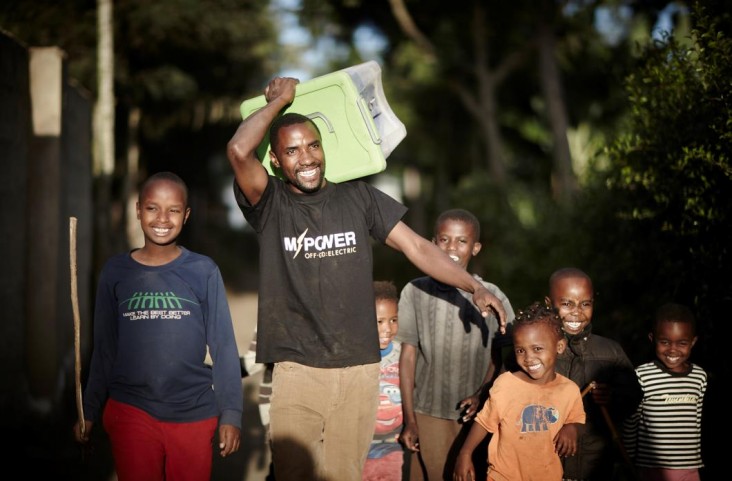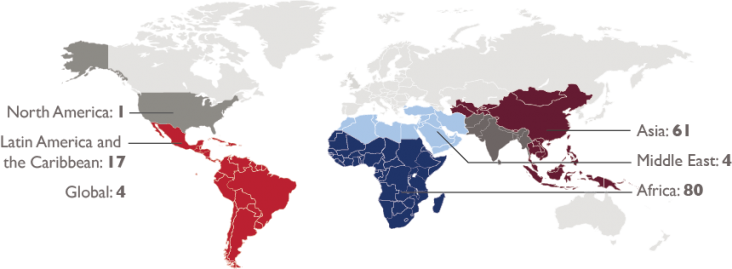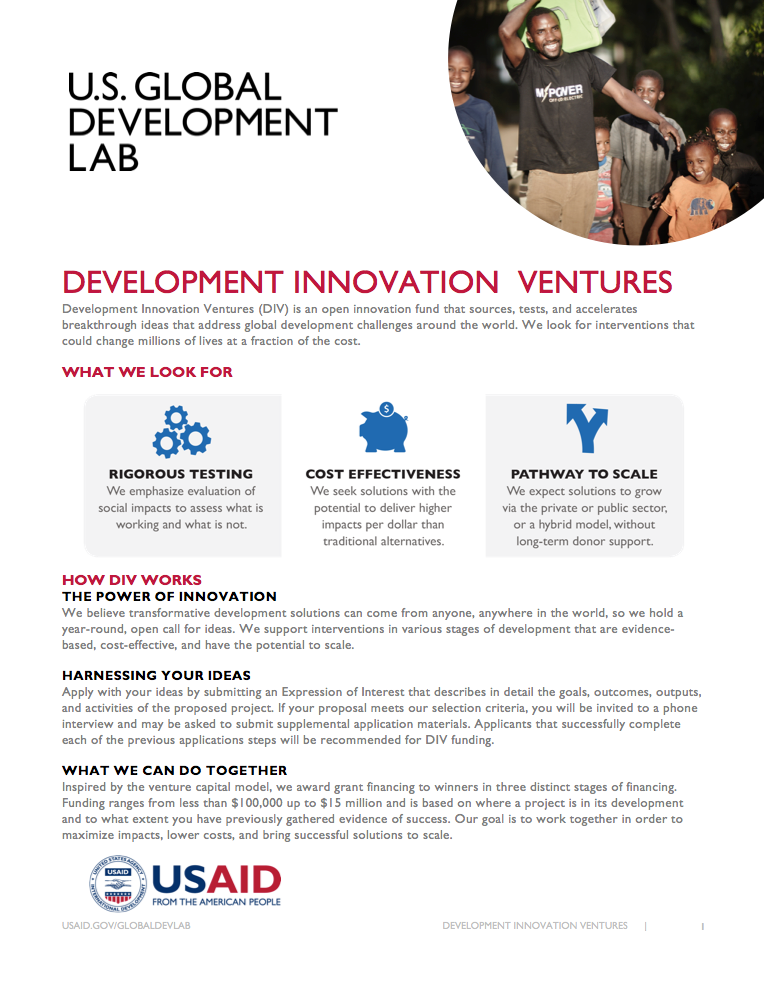
Development Innovation Ventures (DIV) is an open innovation fund that sources, tests, and accelerates breakthrough ideas that address global development challenges around the world. We look for interventions that could change millions of lives at a fraction of the cost.
WHAT WE LOOK FOR

HOW DIV WORKS
DIV Fact Sheet June 2017 ![]() (pdf - 2 MB)
(pdf - 2 MB)
We believe transformative development solutions can come from anyone, anywhere in the world, so we hold a year-round, open call for ideas. We support interventions in various stages of development that are evidence-based, cost-effective, and have the potential to scale.
HARNESSING YOUR IDEAS
Apply with your ideas by submitting an Expression of Interest that describes in detail the goals, outcomes, outputs, and activities of the proposed project. If your proposal meets our selection criteria, you will be invited to a phone interview and may be asked to submit supplemental application materials. Applicants that successfully complete each of the previous applications steps will be recommended for DIV funding.
WHAT WE CAN DO TOGETHER
Inspired by the venture capital model, we award grant financing to winners in three distinct stages of financing. Funding ranges from less than $100,000 up to $15 million and is based on where a project is in its development and to what extent you have previously gathered evidence of success. Our goal is to work together in order to maximize impacts, lower costs, and bring successful solutions to scale.
DIV FACTS AND FIGURES
160+ TOTAL DIV INVESTMENTS

BREAKDOWN BY REGION

BREAKDOWN BY SECTOR

PORTFOLIO ORGANIZATIONS

SNAPSHOT OF OUR PORTFOLIO
OFF-GRID ELECTRIC – M-POWER LAST-MILE SOLAR DISTRIBUTION & DELIVERY
Stage1: $100,000 | Stage 2: $1,001,605 | Stage 3: $5 million (Tanzania) (2013-2018)
Off-Grid Electric provides solar energy to people with limited or no access to the grid in Tanzania, one of the least electrified countries in Africa. It provides a radically affordable solar leasing service, with rooftop panels delivered by a local salesforce and payments facilitated by mobile money transactions. Using mobile money or local kiosks, customers pre-pay for the service in increments as small as a single day. If a customer requires a repair, replacement or upgrade, Off-Grid’s network of service agents provide in-home service at no cost. DIV took a calculated risk on Off-Grid at an early stage and continued to provide funding as it expanded and gathered more evidence. The increase in venture funding from DIV helped demonstrate the economic viability and scalability of Off-Grid’s approach, allowing the company to access additional financing and expand its coverage, accelerating its progress toward the goal of reaching 1,000,000 households by 2017. By early 2016, Off-Grid’s service had reached 100,000 households and was available in 14 regions throughout the country. It continues to add 10,000 new homes a month. Leveraging the three awards from DIV, it has raised $95 million in follow-on capital.
BABAJOB – INFORMAL SECTOR JOB MARKETPLACE
Stage 2: $1,167,285 (India) (2013-2016)
Babajob empowers informal sector job seekers with relevant and accessible information about job opportunities, leveraging mobile technology to make this information widely available. With DIV funding, Babajob created an Interactive Voice Response (IVR) platform to enable lower-literate job seekers to access the service using a basic mobile phone. Job seekers use the platform to create profiles (digital resumes), search for better jobs (e.g. with higher pay, closer to home), apply to jobs that interest them, and receive updates about relevant job opportunities, all for free. The job seeker can also choose to pay (one Indian rupee / $0.02 per day) to receive SMS job alerts with relevant, local job openings. Out of the more than 4,000,000 job seekers who have used the platform since DIV support began, approximately 800,000 offline job seekers have joined Babajob through the IVR system.
PIXATEL – TABLET-BASED, ADOPTIVE LEARNING PLATFORM
Stage1: $180,000 | Stage 2: $1.5 million (India) (2015-2018)
Pixatel developed a tablet-based learning platform that provides children with tailored adaptive content suitable to their individual learning level—using daily practice and testing to ensure children master each topic before advancing to the next one. The platform runs on inexpensive tablets and does not require constant access to electricity or the internet or computer literacy among teachers. Auto-generated metrics allow teachers to target students most in need of attention in real time. In the 2014 school year, the pilot program showed strong potential to improve basic skills attainment, particularly among girls and the lowest performing, remedial students. With DIV Stage 2 financing, Pixatel is expanding testing and implementation from 10 to 25 schools in the 2016-2017 school year and will be deploying apps to digital distribution stores, to test commercialization of the model for scale.
DIMAGI – MHEALTH PLATFORM FOR HEALTHCARE WORKERS
Stage 1: $99,624 | Stage 2: $996,424 (India) (2012-2014)
Dimagi has developed an open source software technology, CommCare, that is suitable for low-resource settings and adaptable to the needs of underserved communities. The company designs clinical interfaces, health information systems, and mobile technologies to perform patient-level disease management, clinical decision support, and health system monitoring. With DIV Stage 2 funding, Dimagi supported the design and implementation of an application for Indian health workers that offers information, such as maternal health education for new mothers of every literacy level and local dialect, and sends reminders about upcoming appointments to both patients and caregivers. Over the course of its award, Dimagi developed the evidence base for its mobile health technology, increased its field team, and built needed core functionality to reach scale. In two years, Dimagi deployed 58 new Commcare platform-based programs, increased its total number of frontline workers using CommCare in India to 3,118, and realized a 23.4% increase in mothers receiving at least two visits during their final trimester of pregnancy.
PONTIFICIA UNIVERSIDAD CATOLICA DE CHILE (J-PAL LATIN AMERICA) – INFORMATION ON THE RETURNS TO EDUCATION
Stage 2: $1,258,979 (Dominican Republic) (2014-2017)
In close partnership with the Ministry of Education, J-PAL is implementing a three-year policy pilot program, Learning the Value of Education (AVE-RD), in the Dominican Republic. Building on earlier research about the effect of information campaigns on educational attainment, J-PAL is implementing a randomized controlled trial to test the effect of informing families about the economic benefits associated with more education on students' decisions to attend and remain in high school. With DIV Stage 2 funding, the Ministry of Education is rolling out these information campaigns in approximately 1,600 schools in the Dominican Republic in 2016. The program is designed to develop a scalable, cost-effective means of delivering information on education returns to citizens in the Dominican Republic and to gather rigorous evidence of its effectiveness to encourage national scale-up.
BANDHAN – TARGETING THE HARDCORE POOR GRADUATION MODEL
Stage 2: $1,467,537 (India) (2014-2017)
Bandhan is working to transform the lives of the poorest in India—particularly women and their dependent families—through its evidence-based Targeting the Hardcore Poor (THP) “graduation model.” This program provides a productive asset, a temporary allowance, mandatory savings, and 24 months of training/mentoring to a female in each participating household. Randomized controlled trials have proven that THP improves women's financial inclusion, income, and household food security. Since launching THP in 2006, Bandhan has scaled to 30 districts in eight states and lifted more than 45,000 households out of extreme poverty, as of March 2016. With DIV Stage 2 support, Bandhan is scaling THP in Bihar and Odisha through a multi-pronged strategy involving direct implementation, provision of technical assistance, and policy advocacy to demonstrate the model’s broad potential.
SUA APOPO – ANIMAL-BASED TUBERCULOSIS DETECTION
Stage 1: $80,000 (Tanzania, Mozambique) (2015-2018)
APOPO uses trained African Giant Pouched Rats, nicknamed “HeroRATs,” to detect tuberculosis (TB) by scent in clinical samples in Tanzania and Mozambique. APOPO collects sputum samples that have already been tested by microscopy in government clinics and re-tests them via HeroRATs. Through scent testing, the rats can screen 100 samples in 20 minutes—significantly faster than lab technicians for whom 100 samples would typically take four days—helping to expedite diagnosis and get more TB patients treatment. Combined, the Tanzania and Mozambique programs have screened over 360,000 sputum samples, detecting 10,000 TB patients that were missed in public clinics. APOPO has increased case detection rates in public clinics by more than 45%, stopping up to 40,000 further infections. With DIV Stage 1 funding, APOPO is testing up to 4,000 prison inmates in Tanzania and Mozambique for TB and assessing the sensitivity, specificity, and cost-effectiveness of detection rats as a triage tool when paired with GeneXpert, a relatively expensive, but highly accurate, DNA diagnostic endorsed by the WHO.
ECO-FUEL AFRICA – VILLAGE-LEVEL GREEN CHARCOAL MICRO-FACTORIES
Stage 1: $100,000 | Stage 2: $1 million (Uganda) (2015-2017)
Eco-Fuel Africa teaches rural farmers, unemployed women, and youth to turn locally-sourced farm and municipal waste into clean cooking fuel briquettes. These are 50 percent cheaper than fuel-wood and burn longer and cleaner. Eco-Fuel Africa developed a simple, purpose-built hydraulic jack machine for the Ugandan market called the Eco-Fuel Press. Using DIV Stage 1 funding, Eco-Fuel enabled 2,500 farmers to use kilns. 460 women retailers improved sales by offering green charcoal and more than 10,000 households became daily users of clean cooking fuel. With DIV Stage 2 support, Eco-Fuel is expanding operations by servicing more high-demand urban markets and providing in-kind equipment and support services to 800 new micro-franchises servicing smaller rural markets.








Comment
Make a general inquiry or suggest an improvement.